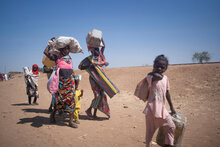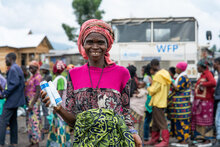Women And Children Face Gruelling Lean Season In Areas Affected By Boko Haram Violence
“The release of women and children held captive by Boko Haram in Nigeria is welcome news, yet we mustn’t forget that women and children bear the brunt of this relentless violence in neighbouring countries as well,” said Denise Brown, WFP Regional Director for West Africa.
“Women displaced by conflict have lost their husbands, walked for days to safety and rely on the support of already vulnerable communities. The lean season is upon us, and as local granaries are emptying, women tell of their families going hungry,” she added.
In the first quarter of 2015, WFP provided food assistance to more than 100,000 refugees, returnees, internally displaced and vulnerable local people, and treatment to more than 30,000 children and nursing mothers suffering from malnutrition in areas of Cameroon, Niger and Chad affected by Boko Haram violence.
But due to a lack of funding less than half the people WFP planned to support with life-saving assistance have received it. In Cameroon, displaced people and host communities missed out on food assistance for four months. Only in April was WFP able to provide food assistance but only to some displaced people and with reduced rations.
WFP is also concerned about the precarious nutrition situation of new arrivals in countries bordering on northern Nigeria, Malnutrition rates among children under five and nursing mothers, surpass the 15 percent emergency threshold (28 percent in Niger and 19 percent in Cameroon).
In communities hosting the waves of refugees and displaced people malnutrition-related admissions to health centres have recently peaked. The current lean season - when hunger needs are greatest - coincides with the rainy season, bringing added health risks.
Violence involving Boko Haram is fuelling new displacement. In the past few days, thousands of people in Niger and Chad have been forced to flee their homes in search for safety. In Cameroon, the number of internally displaced people (IDPs) has tripled in the past four months, whilst across all three countries, the number of IDPs is nearly the same now as the number of Nigerian refugees.
“No one is untouched by the Boko Haram violence. Across the borders, farmers, fishermen, cross-border traders and herders have suffered significant losses. Crises involving refugees, displaced people, food and nutrition are converging on the poorest parts of West Africa,” said Brown.
“WFP is ready to scale up its response rapidly to meet growing needs if we have sufficient funding to do so. Vulnerable communities in dire need of help in these three countries cannot afford to have less than half the support that they so urgently need,” said Brown.
Key Figures:
• Refugees and IDPs: more than 350,000 in Cameroon, Niger, Chad
• Number of people WFP seeks to reach by end of 2015: 395,900
• Funding required by WFP: 74.8 million. Funding secured to date: 15 percent
• Number of people facing an acute food and livelihood crisis in areas affected by Boko Haram violence: nearly half a million (Cameroon – 180,000; Chad – 45,000; Niger – 200,000).
• Women and children: 75 percent of the Nigerian refugees and 84 percent of the IDPs in Cameroon. More than 80 percent of the Nigerian refugees in Niger. Female headed-households are the worst affected by acute food insecurity in Chad.
• Trade: 500,000 to 700,000 cattle would cross the border into Nigeria’s markets from Chad in a normal year. Border closure resulted in a near collapse of livestock trade in Chad.
# # #
WFP is the world's largest humanitarian agency fighting hunger worldwide, delivering food assistance in emergencies and working with communities to improve nutrition and build resilience. Each year, WFP assists some 80 million people in around 75 countries.
Follow us on Twitter: @WFP_WAfrica
For more information please contact (email address: firstname.lastname@wfp.org):
Adel Sarkozi, WFP West Africa/Dakar: +221 776375964
Sofia Engdahl, WFP/Yaounde: + 237 675394956
Arnold Kawuba, WFP/N’Djamena: +23566993420
Vigno Hounkanli, WFP/Niamey: +227 91205585
Elisabeth Byrs, WFP/Geneva: +41 79 473 4570
Frances Kennedy, WFP/Rome: +39 0665133725


